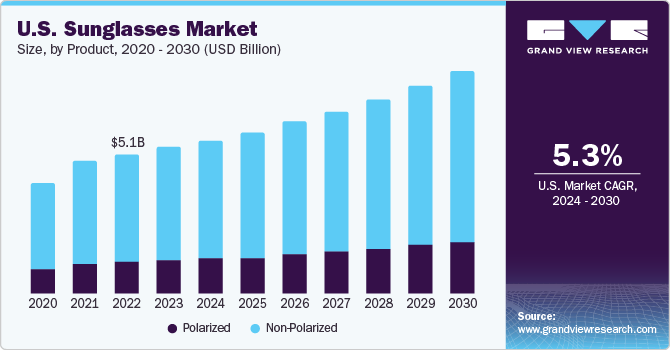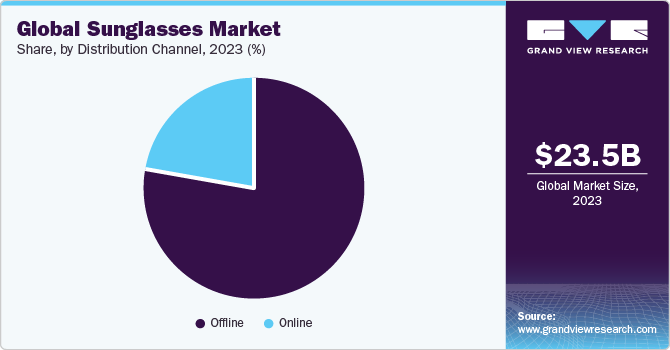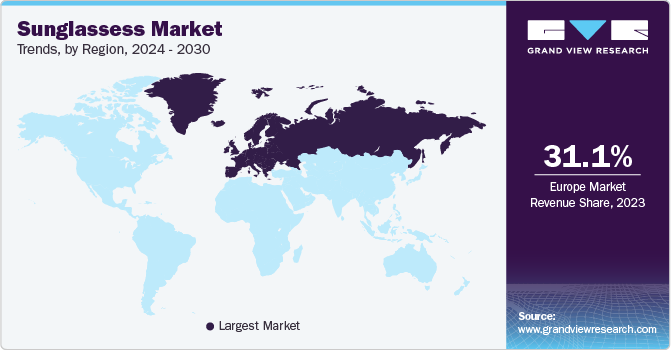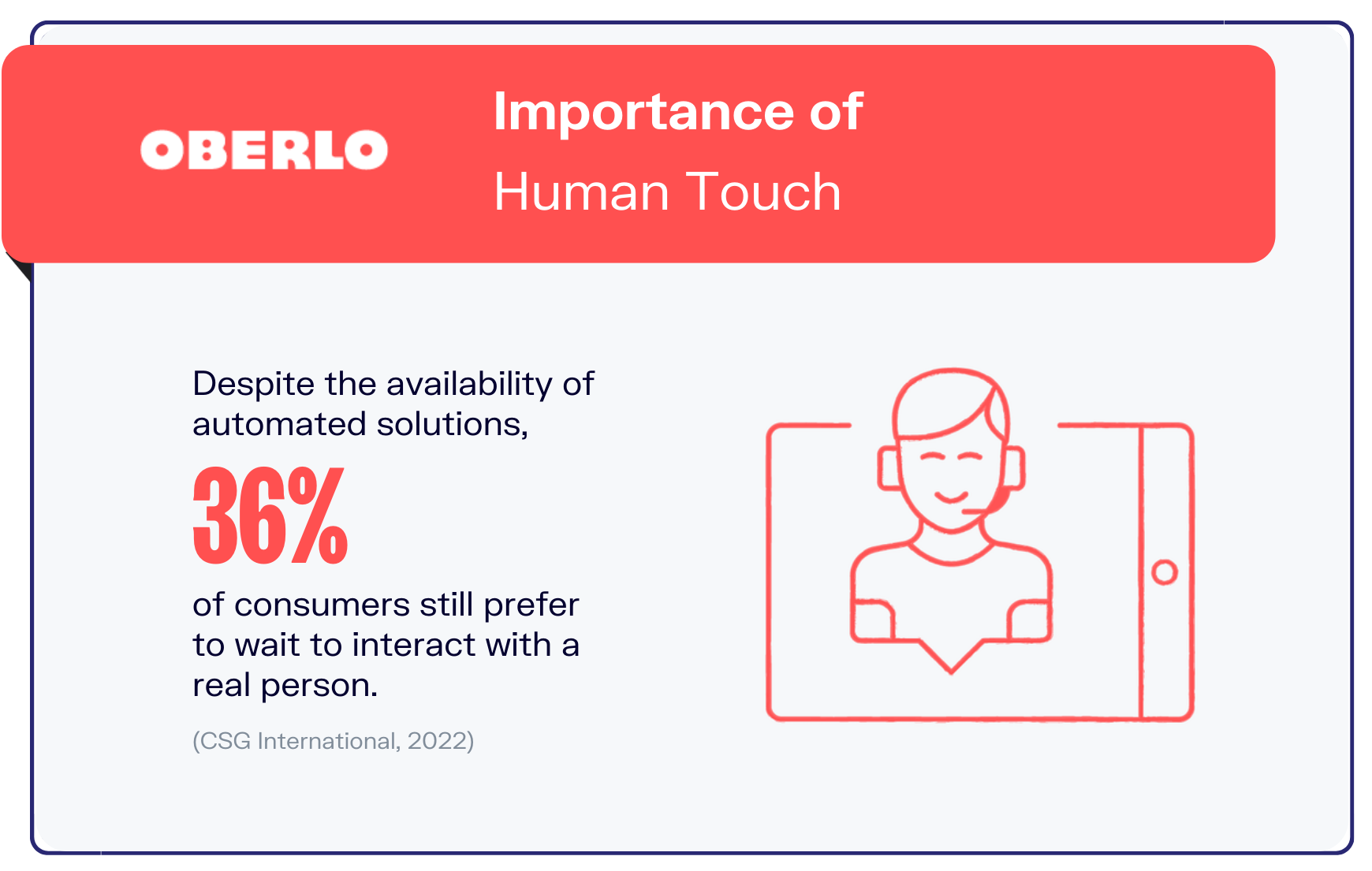According to Statista, the global sunglasses market is expected to grow at a CAGR of over 4.38% from 2024 to 2028. With demand steadily rising over the past decade, the sunglasses industry presents a lucrative opportunity for aspiring entrepreneurs.

This comprehensive guide will walk you through how to start a sunglasses business. Topics include market research, registering an EIN, obtaining business insurance, and trends among sunglasses line products.
1. Conduct Sunglasses Market Research
Market research is important if you want to build a successful sunglasses business. It offers details on potential customers, trends in selling sunglasses, and local market saturation.

Some details you may learn through market research for your own sunglasses business include:
- Popular and affordable fast fashion sunglasses continue to drive mass-market volume sales.
- There is a growing consumer segment that is willing to pay premium prices for branded, designer sunglasses that offer higher margins.
- Barriers to entry in the sunglasses industry remain relatively low, especially for online businesses.
- Small startups can succeed by identifying and targeting niche consumer segments that are underserved by big brands.
- Effective digital marketing then enables new brands to reach such niche groups.
- While competition against such large corporations can seem daunting, smaller disruptive startups have succeeded by offering differentiated products, savvy branding, and engaging social media marketing campaigns.
A sunglasses business presents exciting growth opportunities with a large expanding global market, relatively low barriers to entry, and the potential to carve out profitable niches. Excellent customer service, well-defined marketing strategies, and carefully targeted branding efforts enable small startups to compete and thrive.
2. Analyze the Competition
Understanding the competitive landscape is crucial when launching a sunglasses brand, whether online or via a physical retail store. This involves identifying key rivals in your target market and thoroughly analyzing what they do better or worse than your envisioned offerings.

For brick-and-mortar sunglasses boutiques, conduct an area survey of existing shops and examine their locations, storefront displays, in-store experiences, and pricing strategies. How could your store improve upon its formula to attract customers? Also, research their online presence and social media engagement tactics.
When sizing up potential e-commerce competitors, utilize online tools like SEMRush that reveal vital data around the traffic, search rankings, paid advertising spend, and conversion rates achieved by rival sunglasses e-tailers.
Social listening with tools like Mention also highlights what customers and influencers are saying about competitors online. This surfaces potential gaps or pain points you could solve.
While massive brands like RayBan may seem intimidating to take on, remember that focused small startups can thrive by targeting niche consumer segments other players overlook. Find ways to differentiate with exclusive styles.
By benchmarking against category leaders and direct sunglasses e-commerce competitors using the research tactics showcased here, new entrants spot opportunities to excel in areas where incumbents fail to satisfy customer wants and needs. Carving out a profitable niche as a small disruptive startup is very achievable with the right strategic insights.
3. Costs to Start a Sunglasses Business
Getting a new sunglasses venture off the ground requires careful financial planning and budgeting. Between initial startup costs and ongoing operational expenses, entrepreneurs need to estimate funding needs so adequate capital can be raised before kickstarting their brand.
Start-up Costs
Startup costs encompass all one-time investments when founding the business, including:
- Company registration and administration fees ($200-$500)
- Securing commercial space leases for stores ($3,000-$5,000 first/last months’ rent plus security deposit)
- Building initial inventory ($1,000-$5,000 for a small test batch of sunglass samples)
- Branding logo design and business cards – $500
- Website development – $3,000-$5,000, branded packaging/displays – $500-$1,500
- Retail store owners need furnishings like racks, tables, mirrors, and lights ($2,000-$5,000 depending on store size)
- A point-of-sale system including an iPad, receipt printer, and cash drawer ($599-$1,599 for a basic POS hardware bundle)
- E-commerce sites and photo editing software like Photoshop ($10-$20/month subscription).
Manufacturing your sunglass frames or lenses calls for significant investments in customized fabrication machinery and molds, easily exceeding $100,000.
Ongoing Costs
Ongoing operational expenses kick in once launching your sunglasses brand. Variable costs tied directly to production volumes include materials and third-party manufacturing fees.
- For fabricated acetate or metal frames expect to spend $10-$50 each depending on complexity and order volumes.
- Packaging may cost $2-$5 per unit. Lenses can range tremendously in price from basic CR-39 plastic ($5 per pair) up to higher-index lenses with specialty coatings or features ($25+)
- Fixed overhead expenses are incurred regardless of sales fluctuations, primarily($24,000-$60,000 per year for small retail spaces)
- Storage/warehouse fees if holding significant inventory($3,600-$7,200/year for 500-1,000 sq ft units)
- Utilities like electricity, gas, and water ($300-$800 monthly)
- Liability insurance ($600+ annually)
- Employee salaries including store manager(s) and sales associates ($35,000+ each annually) as well as sales tax remittance and business license fees which vary by state and city.
Budgeting adequately across both variable and fixed sunglass business operating costs is imperative to remain sustainably profitable over the long term. Financial discipline paired with realistic sales forecasts helps avoid common cash flow issues faced by many new startups.
4. Form a Legal Business Entity
Determining the right legal structure for your sunglasses venture lays a critical foundation influencing everything from future growth prospects to personal liability protection. The four main entities to choose from include:
Sole Proprietorship
Sole proprietorships provide an effortless setup with no formal registration needed beyond requisite business licenses. Owners report profits or losses from sunglass operations on their tax returns. However, retaining unlimited personal liability means your assets can be seized to settle sunglass business debts – a dangerous risk for any merchant carrying inventory.
Partnership
Partnerships allow two or more co-founders to operate a shared sunglasses entity. A formal partnership agreement details ownership percentages, profit/loss distribution, and decision-making authority. Still, each partner assumes unlimited personal liability, leaving personal assets vulnerable just as with sole proprietorships. Disagreements between partners can also trigger messy dissolutions.
Limited Liability Company
Establishing your sunglasses venture as an LLC combines personal liability protection with pass-through taxation still reporting business income directly on your tax return. Only your initial capital investment into the LLC is at risk. The LLC status also lends credibility when approaching suppliers, and creditors or raising investment capital.
Corporation
For sunglass merchants planning national or global expansion someday, incorporating as a C corporation instead enables selling ownership shares to raise expansion capital. C corps file separate business tax returns. Downsides include double taxation of profits and increased accounting/compliance fees of around $2,000 annually.
5. Register Your Business For Taxes
While launching your exciting new sunglasses venture, don’t forget essential government registration steps to legally operate. Beyond forming your preferred LLC or corporation, the IRS requires most business entities to obtain an employer identification number (EIN) for tax purposes.
An EIN uniquely identifies your company much like a social security number does for individuals. Applicable even if you have no current employees.
The EIN is mandatory for opening business bank accounts, paying contractors or vendors, filing company tax returns, and, if hiring staff later, reporting payroll taxes. Many government agencies like your state tax department also utilize your EIN for added reporting requirements down the road.
Thankfully applying for your sunglass business’ EIN through the IRS website is easy and at no cost.
The online application process takes under 10 minutes to finish. Required information includes your LLC/corporation name, formation date, address, and tax year-end month. Once submitted, instantly receive your EIN in PDF form. Make sure to download and save your official IRS correspondence for safekeeping.
Next, reach out to your state tax office to register for a sales tax permit, sometimes called a seller’s permit, if you plan to sell sunglasses or eyewear directly to in-state consumers either online or via a physical brick-and-mortar boutique. At this point, you can submit regular tax payments and returns to your state.
Carefully abiding by all government registration and tax compliance processes protects your sunglasses business from costly penalties and fees that squander profitability long term.
6. Setup Your Accounting
Proper financial tracking separates successful sunglasses ventures from those that fail. Invest upfront in bookkeeping software and accounting support to ensure regulatory compliance, maximize deductions, and manage cash flow smoothly.
Accounting Software
User-friendly accounting platforms like QuickBooks streamline mandatory processes like invoicing clients, tracking payments, and categorizing income and expenses. Robust reporting also simplifies year-end tax preparation. Expect costs of around $30/month for essential cloud-based QuickBooks access.
Hire an Accountant
Hiring an accountant immediately allows small sunglass business owners to offload complex paperwork. Certified accountants handle everything from payroll and monthly close to reconciling bank statements and advising on budget decisions aligned with financial goals. Expect to invest around $200 to $400 monthly for such professional support.
Get a Business Bank Account
Always separate personal and sunglass company accounts plus transactions early on. Commingling funds frequently trigger inadvertent tax troubles or masks financial leaks as personal outflows muddy the understanding of true business profitability.
Apply for a Business Credit Card
Apply for a dedicated company credit card solely used for sunglass operating expenditures. Business cards become vital credit records supporting growth. Approval hinges on your credit score yet card issuers typically extend higher limits to fuel enterprises.
7. Obtain Licenses and Permits
Before opening for business, sunglass entrepreneurs must ensure full compliance with assorted licensing and permitting regulations spanning federal, state, and local jurisdictions. Find federal license information through the U.S. Small Business Administration. The SBA also offers a local search tool for state and city requirements.
At the top level, the U.S. Food & Drug Administration requires sunglass manufacturers and retailers like boutiques to register details on sunglasses being imported or sold that utilize certain regulated components.
States layer on added requirements like local business licenses charging $50 to $100 annually to officially operate plus sales tax permits for merchants selling directly to in-state residents. Remember to renew on schedule every year. Some counties and cities impose further business license stipulations on sunglasses purveyors depending on locations.
For store owners of branded brick-and-mortar shops with signage, also confirm compliance with permits around illuminated lighting elements, dimensional rules dictating sign surface areas depending on building frontage, and any zoning approvals needed from local planning departments.
While absorbing these regulatory complexities, lean on attorneys to finalize compliance checklists across trademarks, product safety protocols, store signage permits, and all other licensing essentials before sunglass customers enter your doors. This due diligence eliminates unnecessary financial risks impacting hard-fought startup funding.
With hundreds of permitting and licensing considerations spanning sunglass venture launch phases, don’t let regulatory obligations slip through the cracks that sink dreams. Meticulous upfront planning and professional help navigating requirements lead to legitimate, fully compliant sunglass enterprises ready for smooth success.
8. Get Business Insurance
Even with scrupulous quality control and safety protocols, unforeseen disasters from burst pipes to vehicle crashes can instantly destroy uninsured sunglass inventories worth tens of thousands. Plus customer injuries on your premises open the doors to crushing liability claims.
Getting caught without adequate business insurance threatens company survival – making coverage essential from day one. Core policies to secure include general liability to cover legal costs and payouts if a customer is injured on your property and decides to sue.
If negligent window cleaning leads to falling glass striking a shopper’s head, liability insurance responds. You’ll also need commercial property coverage that reimburses replacements for owned inventory, equipment, and furnishings damaged by covered incidents from tornadoes to smoker’s ashes igniting fires.
Business interruption policies offset some lost profits if disasters force closures for repairs, which is critical for retailers. Commercial auto insurance applies collision, liability, and other protections to company vehicles transporting products, employees, or client visits.
The right insurance partner determines appropriate coverage limits and exclusions tailored to sunglasses operations. Expect monthly premiums between $100 to $300 depending on revenue size, inventory volumes, and coverage types.
Getting insured simply involves contacting trusted insurance agents and conveying your sunglasses business classification, and desired coverage types and limits if known. Agents then source quotes for policy packages from providers like The Hartford, compare terms, and facilitate applications for chosen plans.
9. Create an Office Space
Whether coordinating design approvals with overseas factories or meeting buyers to showcase new collections, securing workspaces beyond homes enables sunglass entrepreneurs to separate professional and personal realms for enhanced productivity.
Home Offices
Converting spare bedrooms into home offices offers convenient, low-cost options for business owners focused on digital tasks like managing e-commerce platforms. Dedicated work zones minimize household distractions during calls or customer service shifts. However, storing extensive product inventory at home rarely proves practical long-term.
Coworking Spaces
As brands grow beyond founding teams, leasing desks within shared coworking spaces like WeWork allows the flexibility to scale teams up or down across several locations while enjoying campus amenities from cafes to conference rooms. Expect membership rates of around $300 monthly per desk.
Retail Showrooms
Sunglass merchants planning a brick-and-mortar presence often overlay office needs with securing retail showroom spaces for customer experiences. Storefronts displaying products for browsing double as meeting venues with buyers or brand reps. All-in-one retail office locations enable seamless operations yet limit privacy.
Commercial Offices
For larger enterprises supporting multiple business divisions, leasing dedicated office suites within commercial buildings often emerges as necessary long-term investments, despite higher rents averaging $3,000 monthly across spaces sized for 6-10 employees. The privacy and versatility of consolidated office settings optimize growth.
10. Source Your Equipment
Launching a sunglasses brand relies on specialized fabrication machinery and retail displays worth tens of thousands. Strategically acquiring requisite equipment separates thriving operations from those hobbled by poor investments. Evaluate new purchases, used deals, rentals, and leases depending on startup resources and growth aims when sourcing equipment.
Buying New
Ordering customized, brand-new spectacle equipment from retailers like OptiSource ensures flawless performance for years while warranties offer protection. However, new medical-grade lens fabrication systems, frame heat benders, and glazing instruments easily surpass $100k upfront.
Buying Used
Searching industry forums or local equipment resellers offers sunglass entrepreneurs chances to save up to 70% purchasing second-hand. While used deals require accepting some wear and tear, properly vetted machinery still delivers years of reliable service at friendly prices. Just budget for preventative maintenance. Facebook Marketplace often lists deals.
Renting
Needing premium machines temporarily? Equipment rentals from national outfits let sunglass startups access industrial-grade tools for limited jobs without six-figure capital investments. Flexible terms spanning daily rates to multi-year leases accommodate different projects.
Leasing
Benefit from perpetual access to the newest specialty equipment by leasing instead of purchasing machines outright. While paying ongoing fees, lease programs enable switching machinery as technological upgrades emerge without major financial hurdles. Leasing also spreads equipment costs over longer periods through increment payments.
11. Establish Your Brand Assets
Crafting distinctive brand assets enables fledgling sunglass ventures to cut through the competitive noise and establish enduring emotional connections with target consumer groups.
Getting a Business Phone Number
Acquiring a unique business phone and fax number lends startups an air of professional legitimacy, whether answering customer inquiries or contacting suppliers. Cloud-based systems like RingCentral route calls seamlessly while providing customizable greetings or on-hold messaging reinforcing brands.
Creating a Logo and Brand Assets
A thoughtfully designed logo crystallizes the visual essence of new sunglass brands onto eyewear arms and packaging. Looka’s AI logo maker helps entrepreneurs select icons and fonts that inject personality into collections. With a bold logo finalized, extended branding elements like slogans, patterns, and graphical kits ensure marketing materials exhibit cohesive styling.
Creating Business Cards and Signage
Vistaprint’s budget-friendly printing services create stacks of business cards to exchange at trade shows or sales meetings to spur future reorders. Retail sunglass merchants also rely on Vistaprint for exterior store signage as well as interior decorative touches like wall art and custom mats that immerse shoppers within brands.
Purchasing a Domain Name
Secure the perfect web address for new brands with Namecheap domain registrations. Opt for .com domains closely matching company names for easy discoverability and trust. Add supporting domains to protect brands like sunglasses brand. co or sunglasses brand-store.com.
Building a Website
Showcase products beautifully online through user-friendly website builders like Wix – no coding needed. Alternatively, skilled website developers found on global freelance platforms like Fiverr craft responsive sites with SEO-optimized content attracting droves of visitors.
12. Join Associations and Groups
Beyond fostering local connections, sunglass entrepreneurs plug into influential industry associations and online communities to access proven insights that accelerate growth.
Local Associations
Area chambers of commerce and industry-specific groups like the Optical Women’s Association host events to convene regional sunglass purveyors. Attending association seminars and networking sessions helps identify sales opportunities while gathering intel on trusted suppliers or emerging trends.
Local Meetups
Sourcing animal-free materials? A Vegan Fashion Meetup helps connect with like-minded designers nearby. The Meetup platform queues upcoming gatherings bridging niche interests to boost knowledge sharing. Trade show visits also spur inspiration for manufacturing innovations or retail display concepts from peers.
Facebook Groups
With over 1 billion daily active users on Facebook, specialized groups unlock crowdsourced wisdom no matter how niche sunglass business aspects get. The VINTAGE SUNGLASSES TRADERS/COLLECTORS FORUM and Glassesshop Fan Club forums share advice and products. Industry insights get exchanged 24/7.
13. How to Market a Sunglasses Business
While crafting trendsetting eyewear, marketing emerges as the crucial engine driving sales of new sunglass ventures. Both digital and traditional strategies help brands connect with target consumer groups.
Personal Networking
An entrepreneur’s most valuable marketing assets already surround them, friends and family make up the first customer base who organically share glowing reviews. Early referral bonuses also encourage happy shoppers to endorse brands across social channels. Small gestures spark word-of-mouth momentum.
Digital Marketing
- Google Ads pinpoint localized searchers actively seeking stylish sunglass options using keywords like “round eco-friendly sunglasses”. Displaying approving customer quotes and competitive prices prompts clicks to online stores.
- Facebook and Instagram posts showcasing collections on aspirational influencer partners expand organic reach when audiences engage posts. Paid boosting multiplies eyeballs.
- TikTok videos highlight sunglass craftsmanship or showcase patrons donning the latest frame releases. Hashtag challenges reward creators featuring products with extra visibility.
- Email collection pop-ups on sites gather subscriber details for regular e-newsletters announcing new product arrivals and special promotions to drive repeat purchases.
- Optimizing sites for search by interlinking related products boost rankings for essential eyewear queries. Higher placements beget increased site traffic.
Traditional Marketing
- Local print ads in culture magazines or regional fashion week programs expand brand familiarity around target customer hotspots. Track campaign response rates to gauge returns.
- Eye-catching storefront displays, like neon signs or life-sized sunburst decals, capture foot traffic passing boutique locations. Experiential elements entice curious walk-ins.
- Bus shelter or billboard banner ads placed near business parks assure professionals frequently commuting absorb the sunglass brand through impactful visuals.
- Pop-up kiosks at busy summer festivals or weekend beach boardwalks intercept crowds, inviting eventgoers to browse the latest collections.
14. Focus on the Customer
Satisfying customers makes the difference between short-lived sunglass ventures and iconic brands with cult followings. How retailers interact with clients cements durable loyalties spanning repeat purchases to invaluable word-of-mouth referrals.

Welcoming shoppers with genuine warmth and attentiveness ensures positive in-store experiences. Small gestures like complimentary beverages, assistance properly adjusting frames for comfort, or confirming complete UV protection build bonds with patrons likely to return while raving to colleagues about service exceeding expectations.
For online customers, response times matter. Answering product questions within minutes and resolving any order issues with empathy demonstrates customer-centric priorities. Shipping handwritten thank you notes with purchases further delights buyers, making them proud advocates.
Even mediocre products get buoyed by exceptionally thoughtful service, but stellar products paired with extraordinary service begets explosive growth. Eyewear buyers stay loyal to retailers proving consistently dependable and caring. They become the best unpaid marketers as word spreads.
For emerging sunglass purveyors, competitors replication designs overnight. Competitors cannot replicate distinctive customer experiences stemming from brands aligned around service excellence. Deliver on experience promises through policies empowering staff to surprise and delight every patron without exception.
